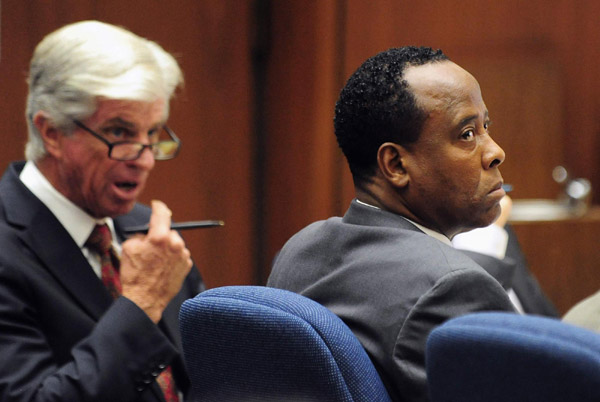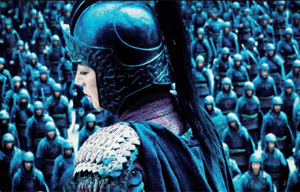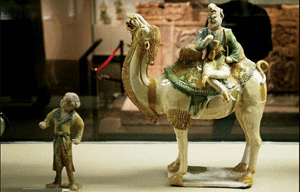'Recipe for disaster' for Jackson's death found
Updated: 2011-10-14 11:32
(Xinhua)
|
|||||||||
LOS ANGELES - A prosecution expert who had reviewed how Michael Jackson's personal physician had treated the superstar before his death noted the mix of drugs was a "recipe for disaster," which, coupled with other missteps by Conrad Murray, led to Jackson's death.
 |
|
Dr. Conrad Murray and defense attorney J. Michael Flanagan (L) listen to testimony during Murray's trial in the death of pop star Michael Jackson, in Los Angeles October 13, 2011. [Photo/Agencies] |
Dr. Nader Kamangar, an Olive View-UCLA Medical Center pulmonary critical care specialist, said Thursday that Conrad Murray administered the powerful anesthetic Propofol, along with the sedatives midazolam and lorazepam he had given earlier on June 25, 2009, which amounted to "an experiment."
"Ultimately this cocktail was a recipe for disaster," he told the court.
The cardiologist gave the pop icon the mix of various drugs "without appropriate monitoring" or record-keeping that would have allowed Murray to follow patterns once the medications were given. Propofol was never approved for use as a sleep aid and Murray's treatment of the singer was "inconceivable," Kamangar said.
"This was the perfect storm I described that culminated in his demise," he told panelists.
He also said a study on the successful treatment of 64 patients suffering from insomnia, which was cited by defense attorneys, was actually done after Jackson's death and was conducted in a safe hospital setting instead of unmonitored home setting.
Jackson was receiving "very inappropriate therapy in (a) home setting," the sleep expert told the seven-man, five-woman jury at the Los Angeles Superior Court.
Kamangar, who reviewed the case for the California Medical Board as an expert reviewer, also blamed Murray for the lack of appropriate emergency equipment to treat his famous patient.
He believed Murray should have called 911 upon making his initial assessment of Jackson after returning to the singer's bedroom and finding that he was not breathing.
The specialist also told the court that he couldn't determine whether Jackson had a "problem" with another drug, Demerol, based on records provided by Jackson's dermatologist, Dr. Arnold Klein, but said it could have been a factor in Jackson's insomnia.
Prosecutors seek to prove Murray, 58, failed to properly monitor Jackson after giving him a lethal dose of Propofol. They contended that the cardiologist "repeatedly acted with gross negligence, repeatedly denied appropriate care to his patient, Michael Jackson, and that it was Dr. Murray's repeated incompetence and unskilled acts that led to Mr. Jackson's death on June 25, 2009."
Defense attorneys argued Murray was weaning Jackson off the medication, but the singer "self-administered" an extra lethal dose. The cardiologist was hired by Jackson to care for him two months before his death.
The trial is expected to last four to five weeks. Murray, who is set free on a bail of $75,000, faces up to four years in prison and the loss of his medical licenses if convicted of the felony charge.










